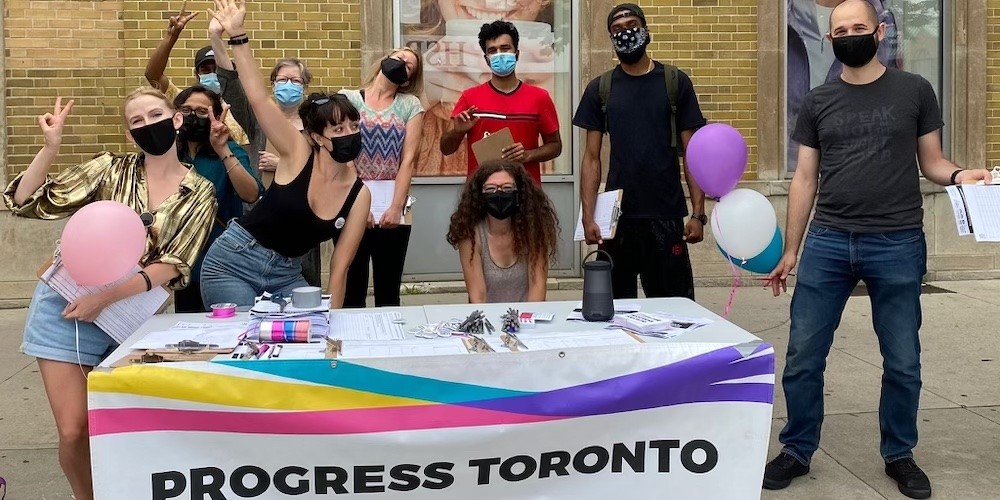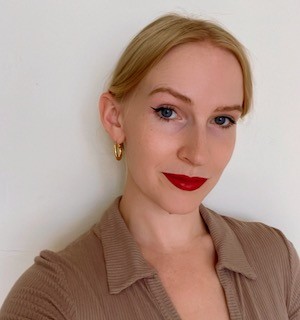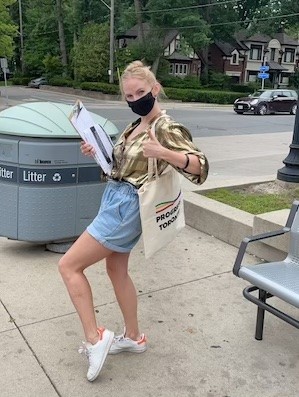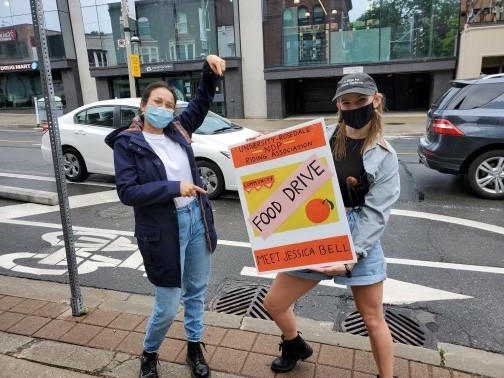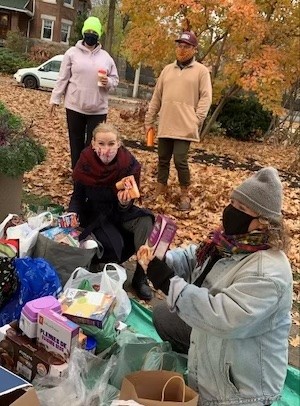Past Lives: Emily Johnson
Past Lives is an interview series with School of the Arts Writing faculty, students, and alumni who began their professional lives on different career paths. In this series, we discuss the lives they led before they became artists—and how their work in other industries informs the creative work they do now. Here, we talk to Fiction student Emily Johnson about the joys of phone banking, grassroots literary readings, and the alchemy of good fiction.
Tell us about your experience in public organizing, activism, and politics. What were you doing? How did you get started?
Emily Johnson: I worked a little bit in electoral politics when I was in my early twenties, and I thought, “This is awful. We're not helping people, we're just making promises.” It just felt gross. It was not what I was interested in; but later on, I found this organization called Progress Toronto that was doing some basic door knocking campaigns around progressive municipal issues, like housing. I did some door knocking with them and then I kept going to their phone banks. Because this is local organizing, it really, really works. That's the thing about municipal organizing that I love so much—you can directly see results. People think it's very murky and it can be, but when elected officials hear back from their constituents, especially in a city like Toronto, it really, really matters.
From there, I met a couple of people who were organizing on the provincial level. They asked if I wanted to be the women's rep on the leadership council for this electoral district association for the progressive party. I began meeting with people who were even more progressive than I was, and I was so inspired by all of these incredibly intelligent people.
One of our main jobs was fundraising, but then obviously the pandemic hit and suddenly people were really struggling for money. People's incomes had been decimated. Housing was in question. We thought, “We can't fundraise in this environment—that just feels wrong. We as a party don't need money. We need to get back to grassroots efforts.”
How did your work change at that point?
EJ: We started doing food banks. We also did some encampment support—because of the housing crisis, there's a huge issue with encampments in Toronto and people living in parks because there's literally nowhere else to go. Shelters are full even though the city will say that they're not. We would get them sleeping bags and gift cards. That was all really, really great work. It allowed us to make connections with people in the community while also making people feel like they were contributing something. I learned so much from working with those lifelong, professional organizers. I really miss it.
Do you see any crossover between the skills you use for organizing, and the tools you turn to for your own writing?
EJ: I find that the skill base that I tap into as an organizer is very different from the one I tap into as a writer, but I'm always interested in how I can write about those organizing experiences. I still phone bank for various municipal or provincial candidates, and it takes a lot of energy to be able to cold call people and say, “Hi, can I have a minute of your time? Can I talk to you about this?”
You need to let things roll off your back like water. If someone doesn't want to talk to you or if there's a language barrier, you have to be able to keep going, and also be ready to have an engaged discussion when somebody is finally willing to talk to you. You have to truly believe that what you're doing makes a difference, because you encounter a lot of resistance and a lot of failure. You need to believe that every single thing counts. If there's any commonality between writing and organizing, maybe it's persistence, because you will strike out so many times.
Organizing is also a nice complement to writing because, obviously, writing is such a solitary pursuit. You are alone in your own head. And for me, I know that I need to be also called out of myself, to talk to and engage with other people in ways that feel meaningful and substantive. It's a nice shock to the system.
Do you find these similarities and correlations help you in your attempt to write about organizing and activism?
EJ: I think the similarities are more superficial than they are substantive. Writing and activism both require a kind of presence, but one is a presence of response, and one is a presence of observation. Writing is about observation, storing and thinking, whereas activism requires responsiveness to the person you’re talking to and trying to incite into action. If anything, writing about activism or organization is almost an ekphrastic art, trying to translate something that is totally unrelated into intelligible artistic language, modulating it into a different form. This is why I find it so challenging, and why I’m interested in it as a literary subject.
The language of organizing is very different from the kind of language that we read in a lot of literary fiction. The novelists that I most admire are working with structures and language with a lot less mass appeal, whereas in organizing circles, and politics in general, you are often working with language that is meant to be widely intelligible, with very definite concrete meanings. Organizing comes with its own specialized language sets, which are very unsexy and un-literary. I'm always intrigued by that challenge of how I can take these very simple, public-facing, kind of bombastic, clear terms, and convert them into something that has literary and artistic interest for me. I don’t know how to do it yet, but I try all the time.
Do you feel inspired by your history in collective action to challenge any aspects of the western workshop model, which has its origins in American individualism?
EJ: I think there are a lot of ways in which MFA programs do need to change, but I also think that at its core, when a room is run in a respectful way and all the participants are participating in respectful ways, we are trying to problem-solve together and create pathways forward—and that can be such a constructive space. I remember before coming into this program, wondering if I wanted to do an MFA program at all. I was thinking, “well, is it just going to collapse all of us into writing the same kind of thing? Is it going to value the same kinds of writing?” To find that it so beautifully encourages many specific voices and allows for so many different kinds of thoughts and styles has been wonderful.
There are still ways that the workshop model needs to shape up and account for the identities that we come to workshop with. Mostly I just love and am inspired by spaces where writers can come together and honor, value, and celebrate each other's work in a way that's not judgmental. I love how reading series in New York City feel similar to grassroots organizing. The vibe is, “we're going to gather in somebody's little basement or living room. We're going to send out an Instagram call. We're going to make a little graphic, and it's all word of mouth, ‘can you get so-and-so to come out.’ We are getting together to do a thing in our community and we need people to come out and show up for us.” Everyone gets so much value from that, from being in community.
How do you respond to fiction that has a clear political agenda? Is your own political agenda something you’re actively working to include in your fiction?
EJ: That kind of didactic writing I have to say does not totally appeal to me. At one point when I was younger it did, I thought I had things that I wanted to impart; but now I realize that that's not what I'm interested in. The thing that actually motivates me or intrigues me is when there's a knot of questions that I want to press into.
Some of the best writing comes out of questions, because it changes your relationship with your reader when you are looking to tell them something instead of inviting them to ask something. It presumes a relationship of a certain kind of superiority or authority. But if it's something that's genuinely troubling you, a question or an issue, and you are writing into that with an earnestness and a genuineness of intent, then I think your reader can feel that and doesn't feel manipulated or led down a very specific path. [Adjunct Professor] Nicole Krauss said something once about how a reader doesn't want to be led or forced down a path and they can tell when you're trying to do that to them, but if you can guide them, or create a path that they want to navigate on their own, or similar pathways that are trending in a certain direction, you can still allow them to feel as though they're making their own decisions and associations. I think those are some of the most exciting reading experiences, so those are some of the experiences that I'm interested in creating.
So would you not say your own work is in the tradition of political fiction?
EJ: I haven’t read a lot of what people might call political fiction, or at least contemporary political fiction, so it's not totally fair for me to say—but I feel like I've never seen it done in a way that appeals to me. Political writing in essays and non-fiction is really, really interesting, because those are just people trying to fling an argument into the world and see what happens with it. But in fiction, I think part of our responsibility as storytellers is to make people question rather than decide.
Why would I as a novel reader want to sit down to be instructed? That's not why I'm here. I'm here to be intrigued, entertained, and provoked. So I think it has to be something that you are genuinely curious about and undecided about yourself in order to make it interesting. Obviously I think about how to dramatize those questions, how to make those questions present in a text. Honestly, that's something I'm still working in and around. I'm writing this novel about a cult right now, and I've been trying to figure out how to write it for a long time. One of my very silly questions has been, “What if you started a union in a cult? How would you unionize a cult? Is such a thing possible?” Because obviously if we're talking the cult of capitalism and the cult of so many different companies, it calls into question the similarity of those structures. How can you organize within a structure like that? I'm interested in not only what a cult might do to someone's thoughts and emotions and relationships, but also how can you combat it? How can you counter something that is so ingrained? How do I make unionizing sexy and how do I make unionizing literary? I'm not sure, but I'm going to try.
Were you always a writer, or was it a skill that activism and community organizing brought out in you?
EJ: I was always a writer, in the sense of how when we're kids, we write stories. I was always a reader and always had notebooks and always thought writing would be part of my life. But I was also doing a lot of theater and wanted to be an actor, and then I also wanted to be in politics and I said, “I'm going to be the prime minister.” Writing was always there in the background in some form or another, and I thought that if everything else was taken away from me, this is what I would do. Writing was always a way to process what was happening and I began viewing it with more interest, especially as I flunked out of university.
Suddenly, I had given myself a strange corner to occupy for a few years. That’s when I actually started to try to get serious about my writing. It was a very slow process of becoming more and more serious about it and realizing that I couldn’t improve anymore on my own. I needed to be interacting more with other writers, I needed other people to be giving me feedback. In fact, if there's anything that organizing can bring to writing circles, it's what we can do about this resource disparity, for people who can't afford to do an MFA or go to retreats. Not all retreats and residencies are funded. There is such a high bar to entry, and it can cost so much money. How do we give resources and tools to writers and give them spaces where they can come together even if they have no money at all?
While I was always kind of a writer, slowly my other interests in life have certainly toned down— until I came back to politics in my late twenties and early thirties and realized that I actually do want to run for office someday. I'm not interested in being the prime minister anymore, though I'm interested in being a city counselor, possibly an MP. Maybe even mayor of Toronto one day. We'll see.
When you’re running a phone campaign or knocking on doors, you need to connect with people’s emotions in such a short span of time. Is that a technique that you also apply to your fiction?
EJ: It’s about making a case for why something matters to you. When I'm on the phone with people for a campaign, I have to be prepared to say, “Here's why I'm calling tonight. Here's why I'm volunteering my time about this issue.” It has to be very, very simple because you don't have a lot of time to indicate care. And indicating care is something that we give to our characters. It's a way of making somebody feel real. If you have a character who is not coming alive, you can give them something to care about or something to dislike, or something to hold in their hands or something to eat. Those are my little shortcut ways of making somebody start to take on more of an identity.
I also think about a character's relationship to the people around them. What is this person's disposition toward community? What is this person's responsibility to and for other people? I tend to write stories about communities and how communities are reacting to problems and strife within them. The stories I'm interested in are also about how individuals manage their place in communities. It can be very distressing when your organization, your group, asks a lot of you. The other side of organizing is that it can be all-consuming.
My friends in organizing and I have talked about this, the question of “when does it stop?” There's no time when I can't check my email. All this stuff has to keep going. We have so much momentum, we have so many projects on the go. There's this additional heft of how this is for the good of this community, or how we need to do this by this election deadline. The boundaries between yourself and what other people need from you can get so blurred. As a problem for fiction, I find that fascinating. What do we owe to other people? And then what do we owe to ourselves, especially if we are people who are committed to individuality but also believe there are a lot of ways in which we can all have more consideration for other people?
Talking to you, it feels like so much of organizing is about being able to clearly share the stories that people need to hear. Is that right? Does that apply to our fiction writing as well?
EJ: What stories do people need to hear? There's a lot of publicizing of struggle and suffering. That's the stuff that gets foregrounded for us so often—look how bad this is. Look how dire this is. Don't you want to do something about it? Opening pathways for people to actually do something about it is a lot more difficult and takes a more nuanced approach and an individualized approach. I do think there is a role for fiction, or I'm really hoping there's a role for fiction in allowing people to see different pathways to collective responsibility.
I think about the things I learned from all those people that I was organizing with—my own political disposition significantly changed just because I liked them. I wanted to listen to them, I wanted to hear about their experiences. And once I started listening, I started making new connections all on my own. I think art has that capacity to be a safe space, a place where you can be challenged in some ways, but it's a private challenge. It's not a public forum, it's not Twitter. You're not being asked to contend or vocalize right away. Reading a novel is a space where you can be confronted, but you don't have to articulate anything right away. It's a space where you can consider and chew over ideas on your own, and allow them to percolate for a while.
That alchemical space that a novel can open up within somebody is one of the most productive spaces we have for giving somebody the impetus to organize or to be involved or to make sacrifices on an interpersonal basis for someone else's good. I think our task as writers is to do it in a way where it doesn't feel forced, and you can set up those chemical reactions to occur on their own.
